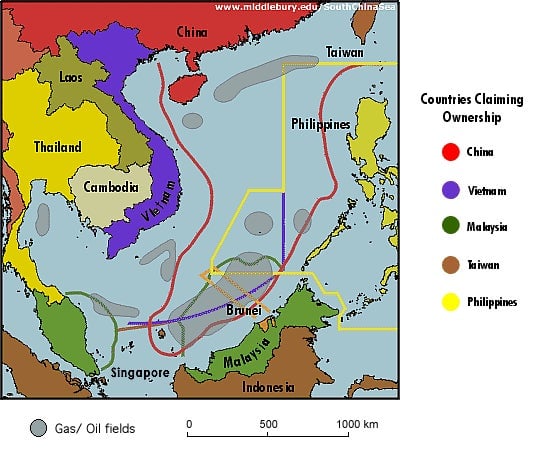China’s police boats make waves in international waters and put US in a tricky position
In the South China Sea, home to a forest of competing claims on undersea oil beds, China is making waves with new policies that would allow its police ships to intercept and divert other vessels. Now even India, which doesn’t claim any territory in the region, is preparing to send in its navy. Quartz talked to Forrest Booth, a maritime lawyer in San Francisco, about the legal issues surrounding this smattering of uninhabitable islands and potential petroleum riches.

In the South China Sea, home to a forest of competing claims on undersea oil beds, China is making waves with new policies that would allow its police ships to intercept and divert other vessels. Now even India, which doesn’t claim any territory in the region, is preparing to send in its navy. Quartz talked to Forrest Booth, a maritime lawyer in San Francisco, about the legal issues surrounding this smattering of uninhabitable islands and potential petroleum riches.
Do countries typically say their maritime police can intercept people in international waters?
It does happen, and the US is in a curious position as a result of that. We have been doing it for a long time—we can board ships in the Gulf of Mexico and the Caribbean looking for drugs … outside of US waters. If the US suspects the ship is carrying drugs that are ultimately destined for the US, we use our Coast Guard to board those ships in international waters and we have made a number of seizures. The US would not have a strong moral position to say that China [shouldn’t do it]. China is doing it for a different reasons and the legal reasoning is a lot shakier. The Chinese are doing it in international waters, not looking for drugs, not something going in to China, [but] doing it to exercise their sovereignty in that area. The Chinese are being much more aggressive than they were before. Some of what China does … is they float trial balloons to see what effects the have, this may be their trial balloon; on the other hand, they have had their warships out there, trying to assert their sovereignty.
How is this going to affect people doing business out there?
What effect it has on the maritime industry is pretty limited—nobody’s talking about closing off any of this area to navigation, ships could go through. What they’re talking about is sub-sea mineral rights, whoever has ownership interest in the seabed. The drilling companies, the Halliburtons of the world, the oil majors, Chevron, Exxon, Total, all those people are very interested in that. No oil company or drilling contractor can really enter into a contract with one country if some other power is claiming the exclusive rights to that area. No one wants to move a drillship that’s worth up to $1 million a day only to have some foreign navy come and run them off and say you can’t drill there.
Will this be resolved anytime soon?
It really falls under the United Nations … there is not going to be a lot of attention paid to that dispute, it isn’t people getting shot or gross human rights violations, and there is a lot of that going on in the world. It’s seen as really what it is, a clash of economic interests. If China sinks a couple of Philippine gun boats or vice versa that might change.
In terms of the economic effect in the long term and the US economy, some of the drilling companies and oil majors from the US may ultimately benefit if there’s a lot of development in that part of the world, or be prejudiced by not being able to participate in what goes on in that part of the world, if the Chinese get too upset with the US, they might say we’re not going to allow any leases be issued to US-based oil companies.